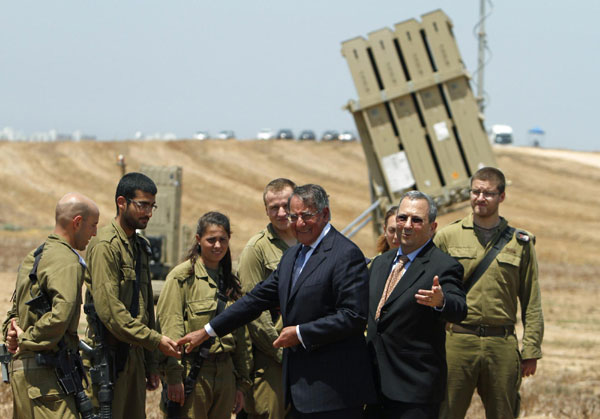US-Israel security ties "stronger than ever"
Updated: 2012-08-02 07:07
(Xinhua)
|
||||||||
TEL AVIV - Israeli Defense Minister Ehud Barak on Wednesday met with US Secretary of Defense Leon Panetta at ministry headquarters in Tel Aviv.
"The relationship between Israel and America in the security field is stronger and tighter than ever," Barak said before the two began their meeting, which analysts expect will cover the increasing violence in Syria and tensions with Iran over its nuclear program.
 |
|
US Secretary of Defence Leon Panetta and Israel's Defence Minister Ehud Barak (2nd R) stand with Israeli soldiers during a visit to an Iron Dome rocket shield battery site in the southern city of Ashkelon August 1, 2012.[Photo/Xinhua] |
Calling Panetta "a true friend to the State of Israel," Barak stressed that the allies "have many shared interests, and we will certainly be busy. There is much to discuss."
Panetta, who arrived Tuesday evening from meetings in Tunisia and Egypt, said upon his departure from Cairo that he and Barak would be covering "various contingencies," but demurred as to whether the two planned to discuss "potential attack plans" against Iran or Syria.
"We obviously continue to work on a number of options in that area," Panetta said, but added that "the discussions that I hope to have with Israel are going to be more about what is the threat that we're confronting and to try to share both information and intelligence on that."
Before going into Wednesday's meeting, Panetta said, "It's because our countries have a strong bond, not only of friendship, but of security -- working together to make sure that we have the strongest defense, and that we can do everything we can to defend both of our countries."
Panetta is scheduled to meet with Israeli Prime Minister Benjamin Netanyahu and President Shimon Peres later Wednesday, and will head for his last regional stop in Jordan on Thursday.
Tuesday evening, Netanyahu said he is still deliberating whether or not to strike Iran's nuclear facilities, and downplayed report that the military echelon is not in favor of attacking Iran.
Netanyahu, at interviews with local media, dismissed earlier reports that Israel's military ranks reject the possibility of a strike on Iran, and said they were just "irresponsible reports," Ha'aretz daily reported.
"In Israel, the political ranks make the decisions and the operational ranks carry them out," Netanyahu said.
Panetta said that "Both of our countries are committed to ensuring that Iran does not develop a nuclear weapon and to that extent we continue to work together in the effort to ensure that Iran does not reach that point of developing a nuclear weapon."
According to a report by Israeli Yedioth Aharonoth newspaper earlier Tuesday, officials in Washington recently named Israel's top security echelon as opponents of a military operation that would exclude the United States.
The unnamed US sources said Israeli army chief Lt. Gen. Benny Gantz, military intelligence chief Aviv Kocahvi, Air Force commander Amir Eshel, Mossad chief Tamir Pardo and Shin Bet director Yoram Cohen objected to a solo Israeli military strike on Iran.
Other former senior security chiefs have come under fire for publicly criticizing the government's statements on Iran.
Former Mossad director Meir Dagan and former Shin Bet chief Yuval Diskin have both previously warned that a strike without US backing would only set back Iran's nuclear program by a few years and ignite a regional conflict with disastrous consequences for Israel.
Panetta said in recent days that he believes that Israel has not yet decided whether to attack Iran's nuclear enrichment facilities, which Israel, the United States and their Western allies believe is a cover for a clandestine weaponry program.
Iran denies the claim, and has threatened dire retribution against Israel, US forces throughout the Gulf, and allies elsewhere were a military strike launched.
Although the United States wants Israel to stay its hand and give a new round of tougher sanctions time to go into effect, US President Barack Obama and other senior officials have said that Israel has the right to defend itself.
Panetta, touching on the sanctions issue, said Monday that " while the results of that may not be obvious at the moment, the fact is that (Iran) has expressed a willingness to try to negotiate with the P5+1 (the United States, China, Britain, France, Russia and Germany), and they continue to seem interested in trying to find a diplomatic solution."
Panetta is also scheduled to visit an Iron Dome anti-missile system battery, used against short-range rockets and missiles, like those regularly fired from Gaza into Israeli territory.

 Relief reaches isolated village
Relief reaches isolated village
 Rainfall poses new threats to quake-hit region
Rainfall poses new threats to quake-hit region
 Funerals begin for Boston bombing victims
Funerals begin for Boston bombing victims
 Quake takeaway from China's Air Force
Quake takeaway from China's Air Force
 Obama celebrates young inventors at science fair
Obama celebrates young inventors at science fair
 Earth Day marked around the world
Earth Day marked around the world
 Volunteer team helping students find sense of normalcy
Volunteer team helping students find sense of normalcy
 Ethnic groups quick to join rescue efforts
Ethnic groups quick to join rescue efforts
Most Viewed
Editor's Picks

|

|

|

|

|

|
Today's Top News
Health new priority for quake zone
Xi meets US top military officer
Japan's boats driven out of Diaoyu
China mulls online shopping legislation
Bird flu death toll rises to 22
Putin appoints new ambassador to China
Japanese ships blocked from Diaoyu Islands
Inspired by Guan, more Chinese pick up golf
US Weekly

|

|






